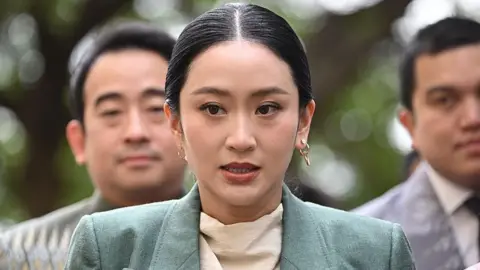Thailand’s political landscape once again finds itself in tumultuous waters, with the suspension of Prime Minister Paetongtarn Shinawatra following the emergence of a leaked phone conversation. The conversation, which notably included remarks made to former Cambodian Prime Minister Hun Sen, has reignited public scrutiny and dissatisfaction towards a political figure who is already navigating a crisis of credibility.
In an unexpected twist, this incident has led the Constitutional Court of Thailand to suspend Paetongtarn while it deliberates on a petition that seeks her removal from office. The court’s decision, achieved by a 7-2 vote, highlights the gravity of the situation and the mounting pressure on her administration. Under the current legal framework, Paetongtarn has a window of 15 days to prepare her defense against the allegations that have arisen from her controversial phone call.
The concerns stem from a particular clip where Paetongtarn, referring to Hun Sen as “uncle,” expressed criticism towards a Thai military commander. Such comments, perceived as undermining national authority, have incited public outcry and prompted serious calls for her resignation. This situation mirrors earlier political crises within the influential Shinawatra family, as this marks a potential third loss of power for a member of the family that has dominated Thai politics over the past two decades. Her political coalition is already on shaky ground, having lost a vital conservative ally just weeks prior.
In the interim, deputy Prime Minister Suriya Jungrungruangkit has stepped in as acting Prime Minister. Should the court ultimately decide to oust Paetongtarn, she will join the ranks of a number of others from the Pheu Thai party who have faced dismissal from leadership roles. This scenario may evoke memories for many, as her predecessor, Srettha Thavisin, was removed for appointing to his cabinet a previously incarcerated lawyer just last year.
Paetongtarn is not only the youngest head of government in Thailand’s history at just 38 years old but also represents a continuation of her family’s political legacy. Her father, Thaksin Shinawatra, is a prominent figure in Thai politics who was himself deposed in a military coup. Interestingly, his ongoing legal troubles, including charges related to an interview deemed insulting to the monarchy, hang over her leadership like a shadow. His trial commenced earlier this week, adding another layer of complexity to the political turmoil enveloping the Shinawatra family.
With the economic landscape in Thailand already strained, Paetongtarn’s approval ratings have suffered a dramatic decline, plummeting from 30.9% in March to a mere 9.2% recently. This stark drop underscores the challenges she faces as Prime Minister; especially in light of her recent apologies for comments deemed inappropriate during the leaked call. She has characterized her remarks as mere “negotiation techniques” aimed at addressing border disputes, yet this justification has not quelled the outcry, particularly from conservative factions who feel her approach is a compromise of national integrity.
The court’s actions on the day of Thaksin’s trial seem almost symbolic, signaling the entangled fate of the Shinawatra family in Thai politics. The family, once representing the apex of political power in Thailand, now faces threats from both public sentiment and legal challenges that jeopardize their long-standing influence. The intertwining of familial legacy and current political challenges suggests that the saga of the Shinawatras is far from over, and the coming days will be critical in determining the future trajectory of both Paetongtarn’s premiership and her family’s political heritage.











